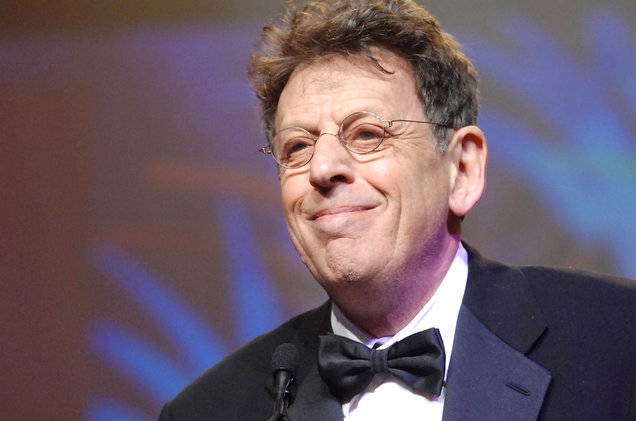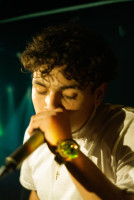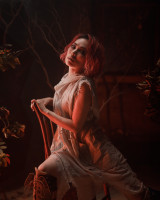Composer Philip Glass hasn't yet seen Jane, the documentary about trailblazing chimpanzee researcher Jane Goodall, for which he wrote the orchestral score, but Monday night (Oct. 9), he will experience it for the first time with a live orchestra at the Hollywood Bowl for a special one-night presentation.
The National Geographic film had its world premiere in September at the Toronto International Film Festival, which he did not attend.
Directed by Brett Morgen, who made the music docs Kurt Cobain: Montage of Heck and Can't Stand Losing You: Surviving the Police, Jane chronicles the pioneering and tenacious life of Goodall, who left her home in England in 1960 to live in Gombe Stream National Park, Tanzania, to study and research the little-known habits and behaviors of the chimpanzee population. Morgan had access to over 100 hours of never-before-seen 16mm footage shot by Dutch wildlife filmmaker -- and Goodall's future husband -- Hugo van Lawick, who died in 2002.
Jane just had its U.S. premiere at the New York Film Festival, which has one screening left Oct. 15, and will open in select theaters starting Oct. 20 in New York and Los Angeles. It plays at Hot Docs in Toronto on Nov. 10-11.
Glass -- who has written dozens of operas, ballets, theater music, symphonies, film scores, experimental theater and more -- had extraordinary footage to work with, featuring "characters" that were loving, protective, aggressive, mourning, jealous, nurturing, just like human beings. The score was performed by The City of Prague Philharmonic Orchestra, conducted by Miriam Nemcova, with concertmaster Lucie Svehlova, pianist Michael Riesman with additional orchestration by Alex Weston.
Jane (Original Motion Picture Soundtrack) is available digitally and physically via Sony Music.
Glass talked to Billboard -- by phone during his two-week interdisciplinary Days & Nights Festival at Golden Bough Theatre in Carmel, Calif. -- about creating the score and the similarities between himself and Goodall, however different their pursuits.
It's a beautiful film. Did Brett tell you he wanted it to be like a "cinematic opera," as he's called it, or did he just show you the footage and get your thoughts?
Like a lot of directors, he has his own ideas. He looked at this from his point of view, which was absolutely correct. I'm coming to it from a background in theater and opera, and large stage things, so we bring different things to it, but I think we work very well together. I think he was surprised at some of the things I did, and he was pleased at some things -- the usual kind of collaboration.
In the end, I think we were both happy with what happened. It took a little while. We were working through it. He has been very involved in this project for a very long time, but, then again, he liked my music a lot too, so I was not a stranger to him in terms of what I was going to be writing. He didn't talk about it being "cinematic" or "theatrical." He didn't use that language really.
I was looking at the footage. I saw it in the process of the film being finished. We were looking at it almost cue by cue, what the music would be like, what he was looking for, and I think we came up with something that we both were happy with.
Hence titles of the track because they seem named for significant moments in the film -- like "Flint Dies," "Hugh Arrives," "Parents and Child," "Aggression," "Community Divides." Is that how you come up with the titles for your tracks?
No. I think he knew ahead of time where he wanted music. When he was doing the rough cut, he was using other music a lot. He had a lot of ideas when he came into this because he had been working with music and cutting the film already, so had a picture of what he wanted. And I found that reasonable and interesting, and we worked well together.
When you saw this footage -- there's stunning aerial shots, close ups of caterpillars, it's vivid, it's beautiful, and then you've got the rustling leaves -- how do you approach it as a composer because you don't want to compete with nature sounds and imagery. There's not continuous music. It enforces or underscores the births, the sadness, the violence, the death.
It's not competing at all. What I'm doing is providing the aural background and the aural context that the film exists in. What I saw is that clearly the great expanse of shots cried out for a big scene. It needed to have that. And then when you have more intimate moments with Jane and the chimpanzees, when they're together, it's a different kind of music.
So if you look at it that way, it goes from the more intimate human scale and then you go into the grand scale of Africa at that time. I wonder, really, whether it would even be possible these days to even film things like that anymore. I mean, this was done about 50 years ago.
I was very aware that we're going from human intimate scale to the expansive and natural world of Africa at that time, and the meter skips around between those. So clearly you did enter the big panoramic shots, you need a big score there, and then when you first see Hugo, it's much more intimate and it's making a different kind of commentary. From my point of view, what we had to capture was most of the panoramic side of the film, which you definitely come away with, but also the human scale, which is very intimate and very emotional. These are the parameters of the film.
The music has to please and live in each of those things in a way that, we hope, sounds effortless, but I don't know [laughs]. It's challenging to do that. It was a great project and challenge for a composer. I'm sure for a filmmaker, and let alone it was a great project for Jane, who's living this life. So for everybody, however you want to look at it, from the main characters of the film to the producer and conceiver of the images to the composer who is underscoring everything else, it was great to do it.
When you were watching the film, did it come to your mind the similarities between between yourself and Jane? She says at one point that she was "absorbed being on my own in this rugged terrain" and "aloneness is a way of life." I imagine as a composer it's the same? It's a solitary pursuit.
I didn't actually consciously think of that, but I think you make a very good point. She is a true pioneer, and, in a way, artists often feel that they are that way, that they're maybe a little bit ahead of the audience at the time, and people don't right away understand what they're doing. I think that's a very good observation. I wasn't conscious of it, but I think you said that with some accuracy and it's a good description of one aspect of it.
You both found your passions very early in life and you've stuck with it. That's quite unique too, and presumably you both still love it, otherwise you wouldn't be doing it?
You're exactly right about that, and we're about the same age. What is she? 82 or 83 now? I'm 80. We're the same generation. I can totally empathize with the world she lived in and came out of it. It's the same world I was living in New York. She was in London, then she was in Africa. I was traveling around the world at the same time that she was around her world. I didn't think about it until you mentioned it.
At the beginning of the film, she says when she was 8 or 9, she was dreaming of living in Africa among the wild animals and suddenly she was living her dream. What did you dream about when you were that age?
I was dreaming about being a composer and writing music. I had that idea from a very early age and, for that reason, it simplified the course of my life. I never wondered what I was gonna do someday; I always knew what I was gonna do. The question was: How did I get there?
And I was fortunate to be in the right places at the right times to meet great teachers, like Nadia Boulanger and Ravi Shankar, and at a time that was intensely interesting. The '60s and '70s were full of conflict and discovery. I would say both of those things.
For Jane Goodall, she was discovering and seeing that world for the first time in a way that other people never had. The idea of bringing someone in, when she was hired to do it, she was chosen because it would be fresh to her. She had no academic background. She had no academic credentials. She was someone who was enthralled and in love with wildlife and Africa and she was absolutely delightful to that.
After watching the film, do you have a bigger appreciation of chimps? What did you learn about them that you didn't know?
Actually, I haven't seen the film yet [laughs]. I saw it moment by moment while we were working on it. I don't know that even ever saw a playback of the whole thing because he was still working on it. They were still editing and putting it together. I more or less conceptualized what it looked like. I'm going to see it for the first time at the Hollywood Bowl.
That's amazing that a live orchestra will play along to the screening.
As you can imagine, I'm really looking forward to it. To me, working with it conceptually, when you work in film, that's a normal way of working. Because he was in Los Angeles, and by the time he was getting to that stage, I was back touring again, so there was no way for me to sit in the same room with him, and look at what he was doing. We talked about it a lot. I had been to California several times to look at the early footage. I was following the script, so to speak, but I saw it shot by shot, really.
When we finished the score, we recorded it, but I had no visual reference exactly. I was working with the music editor, Suzana Peric, and we were fitting the music into the scenes, and that was important. We sent that to Brad, and he would make his comments. We worked on it, but we were working on it section by section. I don't think we ever sat down and watched it from beginning to end.
It's the way that all different kinds of things happen when you're making a film. In a way, this was more completed because a lot of it was footage from 40-50 years ago. We had seen that. We didn't have to wait to see it. We saw all the interviews. We could see it in pieces. That was a big help. We were able to synchronize music and each section the way we thought it should work.








